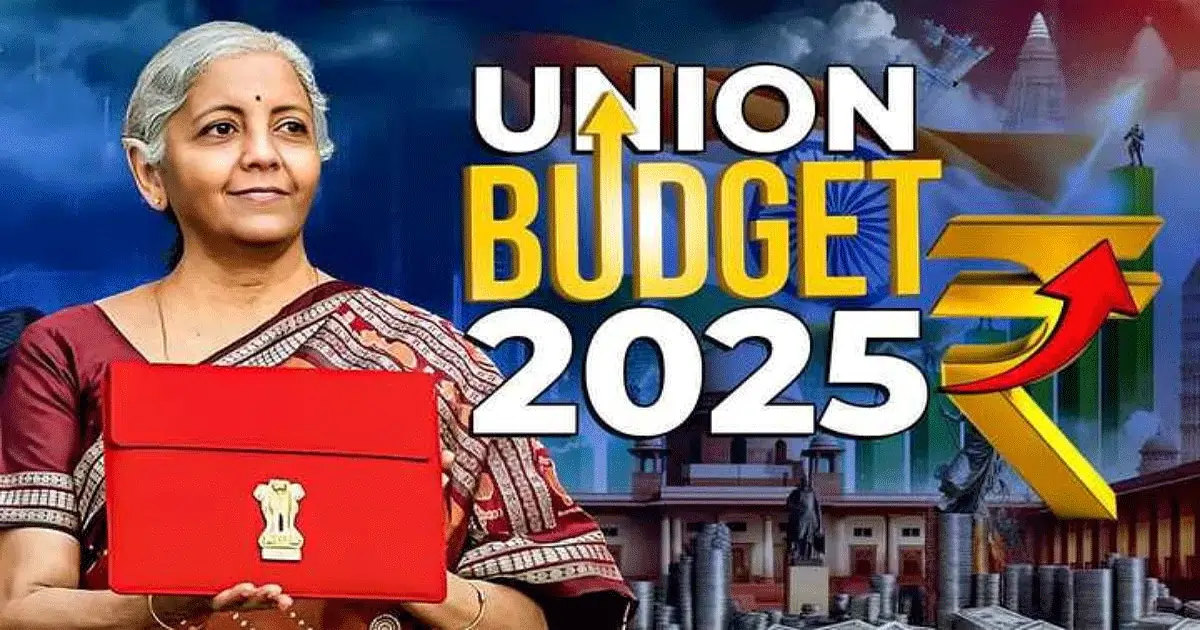Business
Budget Session To Feature Key Economic & Policy Bills Shaping India’s Fiscal Landscape

New Delhi: Following the presentation of the Economic Survey on January 31 and the Union Budget on February 1, the Budget Session 2025 is poised to address a range of significant legislative matters.
This year’s session will not only include the introduction and passage of key bills but also crucial financial discussions that will shape India’s fiscal landscape.
Series Of Important Bills Likely To Be Taken Up
A series of important bills are likely to be taken up during the session. These include the Banking Laws (Amendment) Bill, 2024, aimed at strengthening banking regulations and oversight, and the Railways (Amendment) Bill, 2024, which focuses on enhancing the operational efficiency of the Indian Railways.
Another notable proposal is the Disaster Management (Amendment) Bill, 2024, which seeks to improve disaster response mechanisms across the country.
Additionally, the Oilfields (Regulation and Development) Amendment Bill, 2024 will propose updates to the laws surrounding oil exploration and extraction, while the Boilers Bill, 2024 is set to introduce new safety and operational standards for boilers in industrial applications.
Among other bills likely to be introduced is the Readjustment of Representation of Scheduled Tribes in Assembly Constituencies of the State of Goa Bill, 2024, which will address the reallocation of assembly constituencies to better represent scheduled tribes in the state.
The Waqf (Amendment) Bill, 2024 and the Mussalman Waqf (Repeal) Bill, 2024 are also expected to bring reforms to the management of religious endowments.
Maritime Laws To See Several Updates
Maritime laws will see several updates, with the Bills of Lading Bill, 2024, Carriage of Goods by Sea Bill, 2024, Coastal Shipping Bill, 2024, and the Merchant Shipping Bill, 2024 all set to modernize shipping regulations.
Above all, the Finance Bill, 2025 will be central to implementing the budgetary proposals and tax reforms which will be announced by the finance minister on February 1.
Other key bills include the Protection of Interests in Aircraft Objects Bill, 2025, which will safeguard financial interests related to aviation, and the Immigration and Foreigners Bill, 2025, which will bring changes to immigration and foreigner regulations in India.
In terms of financial business, the session will see the discussion and voting on Demands for Grants for 2025-26, followed by the introduction, consideration, and passage of the related Appropriation Bill.
The Discussion and Voting on Demands for Grants for 2025-26 is an essential aspect of parliamentary procedures, allowing for the approval of government spending for the upcoming fiscal year while promoting accountability and transparency.
Demands for Grants are essentially requests made by the government to Parliament, specifying the amount of money it needs to meet its expenses for a given year.
These expenses cover a wide range of areas, such as infrastructure, healthcare, defence, education, welfare programs, and more. Each ministry or department submits its own Demands for Grants, detailing the specific amounts needed to fund its activities and programs.
Additionally, the Second and Final Batch of Supplementary Demands for Grants for 2024-25 will be reviewed, along with the introduction and passage of the relevant Appropriation Bill.
What Are 2nd & Final Batch Of Supplementary Demands For Grants For 2024-25
The Second and Final Batch of Supplementary Demands for Grants for 2024-25 refers to additional funds that the government seeks to allocate after the presentation of the annual budget for the fiscal year. These supplementary demands arise when there are changes in the government’s spending needs, which were not anticipated during the initial budget preparation.
The session will also address the Demands for Excess Grants for 2021-22, which will require discussion, voting, and the introduction of a related Appropriation Bill.
Demands for Excess Grants for 2021-22 refer to additional funds that the government seeks to appropriate for the financial year 2021-22 when the expenditure incurred by various ministries or departments exceeded the amount originally approved by Parliament in the budget for that fiscal year.
Business
Job postings in India stay above pre-Covid pandemic levels: Report

New Delhi, Nov 27: Formal job creation in India softened in the month of October but despite this, job postings remained above the pre-Covid pandemic level, a report said on Thursday.
“Amid slowdown, Indian job postings are still 60 per cent above pre-pandemic levels, but have fallen 25 per cent since their peak in January 2023,” Indeed, a leading hiring platform, said in its report.
Over the past three months, job postings declined in almost three-quarters of occupations. Yet in a softening job market, there will still be some strong performers, and the past three months have been no exception, said the report.
Job postings in cleaning and sanitation rose around 20 per cent over the past three months, ahead of community and social service (17.4 per cent), dental (13.1 per cent), nursing (11.2 per cent) and food preparation and service (10.3 per cent).
Another positive was the posting for human resources, which climbed 2.3 per cent.
However, these gains were more than offset by weakness in banking and finance, where postings fell 25.6 per cent, along with legal (-22.4 per cent), retail (-16.7 per cent) and loading and stocking (-15 per cent), the report noted.
Every month, the Indian workforce gradually transitions towards more formal work arrangements. As the nation transitions, job creation in the formal sector is expected to outpace overall employment growth nationwide, said Callam Pickering, Indeed’s APAC Senior Economist.
“This transition is also why job postings in India have been stronger than in other Indeed markets, both during the post-pandemic job boom and the subsequent slowdown,” he added.
Meanwhile, during the month, 9.1 per cent of Indian job postings explicitly mentioned phrases such as ‘work from home’ or ‘work remotely’ in their job descriptions. That’s up from 7.6 per cent a year ago.
Remote opportunities are most common in IT infrastructure, operations and support at 18.2 per cent of postings in the October quarter 2025, ahead of community & social service (15.1 per cent) and industrial engineering (14 per cent).
Business
From Kachchhi Kharek to Kesar Mango: Over 10 treasures of Kutch and Saurashtra earn GI tag

Gandhinagar, Nov 27: Prime Minister Narendra Modi has consistently championed India’s indigenous and heritage products, placing local strength at the heart of national growth. His call for Vocal for Local and Aatmanirbhar Bharat has given visibility to artisans and farmers across the country.
In line with this vision, the Prime Minister has also actively promoted Geographical Indication (GI) products, highlighting them in his radio address Mann Ki Baat and personally felicitating artisans who preserve traditional crafts.
Union Commerce and Industry Minister Piyush Goyal has set an ambitious goal of reaching 10,000 GI-tagged products across India by 2030 under the vision of “Vikas Bhi, Virasat Bhi.”
Gujarat has emerged as a strong contributor to this national mission by promoting its rich artisanal heritage, from Kutch’s celebrated crafts to Saurashtra’s premium agricultural produce on global platforms.
GI tagging reinforces the state’s commitment to “Viksit Gujarat to Viksit Bharat,” transforming local skills into global competitiveness. Kutch and Saurashtra together have secured GI recognition for over ten iconic products, including Ajrakh block printing, Bandhani tie-dye, Rogan art, Kutch shawls, the famed Kachchhi Kharek, and the globally loved Gir Kesar mango.
The upcoming Vibrant Gujarat Regional Conference (VGRC) in Rajkot will spotlight the region’s craft excellence and export capacity, offering artisans a robust platform to scale their businesses.
Renowned for its blend of tradition and artistry, Kutch boasts GI-tagged crafts such as embroidery, Ajrakh printing, Bandhani, Rogan painting and the Kutch shawl. In the agricultural category, Kachchhi Kharek — a celebrated variety of date known for its rich flavour and nutritional value has also earned GI status.
Saurashtra’s signature products include Gir Kesar mango, often hailed as the “Queen of Mangoes,” the famed Jamnagari Bandhani, and the exquisite Rajkot Patola silk weaving tradition, cherished by Bollywood celebrities.
Surendranagar’s Tangaliya shawl, with its intricate weaving technique, has also built a loyal international following. The upcoming VGRC for Saurashtra and Kutch aims to accelerate the region’s artisan economy.
The two-day conference will bring together entrepreneurs, artisans, interior designers and product designers, creating avenues of collaboration with the Government e-Marketplace, private enterprises, investors and leading e-commerce platforms. The event promises to enhance innovation, expand market access and drive sustainable growth for traditional craft clusters.
Business
Young innovators worldwide can find inspiration from confidence of India’s Gen Z: PM Modi

New Delhi, Nov 27: Prime Minister Narendra Modi on Thursday lauded India’s Generation Z for their confidence and capacity building.
Speaking via video conferencing at the inauguration of the Infinity Campus of Indian space startup Skyroot and unveiling its first orbital rocket, Vikram-I, PM Modi praised the country’s Gen Z for their positive mindset and creativity.
“Our youth, our Gen Z, are developing solutions to challenges in every sector. Young innovators around the world can find inspiration from the confidence of India’s Gen Z,” PM Modi said.
“The capacity building, positive mindset, and creativity of India’s Gen Z can set a global benchmark for Gen Z across the world,” he said.
Emphasising that India’s youth always place national interest above all and make the best use of every opportunity, PM Modi remarked that when the government opened the space sector, the country’s youth, especially the Gen-Z generation, came forward to take full advantage of it.
He highlighted that today more than 300 space startups are giving new hope to India’s space future, and noted that most of these startups began with small teams — sometimes two people, sometimes five, sometimes in a small rented room — with limited resources but with determination to reach new heights.
“This spirit has given birth to the private space revolution in India,” said the Prime Minister. He noted that Gen-Z engineers, designers, coders, and scientists are creating new technologies, whether in propulsion systems, composite materials, rocket stages, or satellite platforms.
PM Modi stressed that India’s youth are working in areas that were unimaginable just a few years ago.
He remarked that India’s private space talent is establishing a distinct identity across the world and added that today, for global investors, India’s space sector is becoming an attractive destination.
The Prime Minister remarked that the changes being witnessed in the space sector are part of the broader startup revolution taking place in India.
“Over the past decade, a new wave of startups has emerged across diverse sectors such as fintech, agri tech, health tech, climate tech, edu tech, and defense tech, with India’s youth, particularly the Gen-Z generation, providing innovative solutions in every field,” PM Modi said.
PM Modi emphasised that “India has now become the world’s third-largest startup ecosystem”.
There was a time when startups were confined to a few big cities, but today they are emerging from small towns and villages as well, the Prime Minister said, underlining that the country now has more than 1.5 lakh registered startups, with many of them having achieved unicorn status.
“India is no longer confined to apps and services but is now advancing rapidly towards deep-tech, manufacturing, and hardware innovation,” said the Prime Minister, thanking Gen-Z.
-

 Crime3 years ago
Crime3 years agoClass 10 student jumps to death in Jaipur
-

 Maharashtra1 year ago
Maharashtra1 year agoMumbai Local Train Update: Central Railway’s New Timetable Comes Into Effect; Check Full List Of Revised Timings & Stations
-

 Maharashtra1 year ago
Maharashtra1 year agoMumbai To Go Toll-Free Tonight! Maharashtra Govt Announces Complete Toll Waiver For Light Motor Vehicles At All 5 Entry Points Of City
-

 Maharashtra1 year ago
Maharashtra1 year agoFalse photo of Imtiaz Jaleel’s rally, exposing the fooling conspiracy
-

 National News1 year ago
National News1 year agoMinistry of Railways rolls out Special Drive 4.0 with focus on digitisation, cleanliness, inclusiveness and grievance redressal
-

 Maharashtra1 year ago
Maharashtra1 year agoMaharashtra Elections 2024: Mumbai Metro & BEST Services Extended Till Midnight On Voting Day
-

 National News1 year ago
National News1 year agoJ&K: 4 Jawans Killed, 28 Injured After Bus Carrying BSF Personnel For Poll Duty Falls Into Gorge In Budgam; Terrifying Visuals Surface
-

 Crime1 year ago
Crime1 year agoBaba Siddique Murder: Mumbai Police Unable To Get Lawrence Bishnoi Custody Due To Home Ministry Order, Says Report












